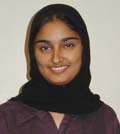| Maryland Newsline |
| Home Page |
Politics
|
| Student Works to Foster
Understanding Between Muslims and Other Americans By
Aatifa Khan:
"Tolerance isn't enough." Series: Tragedies' Footprints Outside the Baitur-Rahman
Mosque in Silver Spring is an American flag and a sign that reads "Love
for all, hatred for none." Inside,
hundreds of Muslims pray for lives that were lost Sept. 11 and for lives that have
been disrupted -- including their own. Aatifa
Khan, 18, leaves time for prayer, and time for more worldly actions. She says she’s never been as
busy as she is now at the mosque,
where she teaches Sunday school classes for children and acts as
"propagation secretary," in charge of improving public
understanding of Islam. “I used to look at my work as a duty, an obligation to
be filled,” Khan says. Now she finds
herself pulling together pamphlets, organizing events and looking for ways
in her own life to foster understanding between Muslims and other
Americans. If there’s anything she’s learned
since Sept. 11, it’s that “tolerance isn’t enough,” Khan says.
“You have to learn about other religions, and to understand them.” Although
her parents emigrated to the United States from Pakistan 30
years ago, Khan was born and raised
here. She
studies physiology and neurobiology at
the University of Maryland, College Park, in preparation for a career as
a dentist. What
separates her physical appearance from her peers is the hejjab, the Muslim
covering of her hair, which she began wearing when she was 14. Khan says the recent
terrorist attacks, and their implications for Arab and Muslim Americans,
have her mother worried. “My
mother is really cautious now,” Khan says.
“She tells me to come home right after class, not to talk on the
Internet about what happened. She’s
worried about my safety.” And she has a right to be
worried, Khan says. Many of her friends and relatives have
been confronted and even assaulted since the attacks. One of her friends, who wears
the hejjab, was pushed to the ground at a Metro station in Washington the week
following Sept. 11 by someone who screamed out that she was a
murderer. About two weeks after the
attacks, someone shouted, "You’re
all terrorists" to her cousin, while he shopped at a Walmart in Norfolk,
Va. Khan says other friends and relatives have had to deal with countless
similar verbal attacks. She herself has been lucky,
she says, because she spends most of her time on campus, where that sort
of behavior is not tolerated. “On campus, I’ve felt
really safe, and no one has confronted me, but out on the street, people
can do or say whatever they want,” she says.
(A spokeswoman for the nearby
Montgomery County Police Department says officers have seen an
increase in "hate crimes directed to members of the Islamic
community" in that jurisdiction since the Sept. 11 attacks. Between that date and Oct. 17,
22 possible hate crimes were reported in the county, compared to five in
an average month, says spokeswoman Lucille Baur. Most of the 22 were
against Muslims or Jews, she says. But a spokeswoman for the Prince
George's County Police Department says officers have not seen an increase
in hate crime reports there.) Khan says she is making a
conscious effort not to change her habits as a result of the attacks, but
adds they have had an effect on her, particularly on her awareness of
others' possible
perceptions of her. “It’s affected how other
people might view me, but also how I feel they might view me,” she says.
Khan’s family has an American flag
up on the main window of their house in Laurel, Md., and one on each car. “Everyone knows we’re different,” she says, “and they need
to know this is our country, and we’re not terrorists trying to bomb
this country. ... “We’re actually very patriotic,”
Khan says. “[People] may think we’re doing it for safety reasons, but
our religion teaches us to be loyal to our country.
If we’re not loyal to our country, we’re not obeying our
religion.”
|

